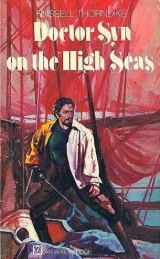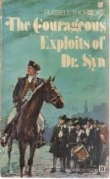
Текст книги "Doctor Syn on the High Seas"
Автор книги: Russell Thorndike
Жанр:
Исторические приключения
сообщить о нарушении
Текущая страница: 7 (всего у книги 14 страниц)
Chapter 7
The Friend of the Family
At the coroner’s inquest, held in the card-room at Iffley, it was
apparent to the conspirators that no hint of suspicion that a trick had
been played upon them had entered the minds of the jury. Indeed, the
coroner himself opened the proceedings by stating that the case was a
straightforward one, and need not detain them long. In the absence of
her mother, who was too ill to attend, Imogene recounted to the court
the details of their cruel abduction from White Friars. She stated that
while her mother was locked in one room, the deceased had attempted to
love her forcibly in the very room in which the court was sitting. She
told them of the letter which the Squire had sent to Doctor Syn, and
which had been the means leading to their rescue. The unexpected
arrival of Captain Nicholas Tappitt, who had known them in Spain, backed
by the presence of Doctor Syn and his friend Mr. Cobtree, had insured
their safety, but not before the Squire had heaped such insults upon her
mother and herself as Doctor Syn, as a man of honour and her betrothed
lover, could not tolerate. The result was the meeting next morning in
Magdalen Fields.
The three young men were then called, and told the same story. They
had agreed that no mention should be made of Sommers or of the s ecret
stairway, but Doctor Syn found himself continually staring at the panel,
half expecting the avenging farmer to appear and tell the truth. But
having accomplished his work of vengeance, Sommers was wise enough to
remain on his side of the river.
After the details of the duel had been given by the seconds, the
pistols and fatal bullet were exhibited, and the two gypsies took their
stands as witnesses. The coroner said that there was no doubt in his
mind that the duel had been carried out with the strictest regularity
between gentlemen in an affair of honour, the jury agreeing that
everything was perfectly regular. As a matter of course they were asked
to view the body in the shuttered bedroom of the deceased, where the
surgeon bewildered their simple minds with the longest medical words at
his disposal, and the most of them were thankful that the stiffened dead
man’s hand was completely covering the actual wound.
A verdict of “Death in an Affair of Honour” was returned, and the
coroner wound up proceedings with a tribute to the young parson’s
courage, and to Captain Tappitt’s impartiality. The Captain’s behavior
had been gentlemanly throughout, and he hoped he would live long to
enjoy his sudden inheritance.
The results of the inquest brought another flood of congratulations
to Doctor Syn from all classes of the town and countryside, to which Syn
replied wistfully that he had yet to face the Bishop of The Diocese on a
charge of violating his cloth.
But the Bishop, neither wishing to fly in the face of public opinion
nor to give the appearance that he was swayed by it, pretended to be
ill, and begged the Chancellor to take over full responsibility and
advise him of the results. The Chancellor pointed out to his Lordship
that although nominally Head of the University, and conveniently
resident in Oxford, the duty of presiding over such a court must fall
upon the Vice-Chancellor, who was responsible for keeping the peace in
the colleges. Fortunately for Doctor Syn, this important official was
also his good friend, so that when two days later the young Doctor took
his stand before an assembly of clergy convened in the Sheldonian
Theater, he felt confident that the court would take no drastic steps
against him.
– 51 -
The Hall was packed, not only with students, but with all the fashion
of the neighbourhood, and although the Vice-Chancellor thundered against
the evil practice of dueling, warning the students that should any of
them take part in such an affair he would be sent down in disgra ce, yet
he owned that in this particular case he felt obliged to deal mercifully
with such a brave young man.
Thus was Doctor Syn acquitted, and that very night a supper was given
in his honour by the students. Both Tony and Nicholas went with him,
and since it was held in an upper room of the old Mitre Inn, which
Doctor Syn was in no mind to check, the jolly students drank themselves
beneath the table. Neither Tony nor Nicholas could out drink Doctor
Syn, and they afterwards confessed that although he drank as much as
any, he was the only one who remained sober. Nicholas swore that such a
grand capacity was wasted in a parson. But Doctor Syn was yet to know
how useful it was to be able to consume more bottles than the next man
and yet come out clear-headed.
In the days that followed, Doctor Syn discovered that an admiration
which he had never quite resisted for Nicholas had developed into a fast
friendship. Possessed now of his uncle’s wealth, the young man began to
enjoy life with zest, and insist ed that his friends should do the same
and share his fortune with him. Nothing could daunt his kindness and
concern, and he would wave aside their continual gratitude with “I am a
friend of the family, I hope?” Imogene especially delighted in his
company, and Doctor Syn was glad of this, since, owing to the mother’s
illness, Imogene was kept somewhat a prisoner in White Friars. Nicholas
was a welcome relief to the girl from the monotony of nursing. It was
delightful to talk of her beloved Spain to someone who knew it well and
could converse in excellent Spanish. He was also a proficient performer
on the guitar, and could sing her favorite love-songs.
Seeing that Imogene loved to speak her native tongue and her it
spoken, Doctor Syn resolved to learn, and in this he was helped as much
by Nicholas as by Imogene herself. On one occasion when Nicholas had
praised him for an improved accent and an ever-growing vocabulary, the
Doctor cautioned him in jest with:
“You must take care, you know, for I shall so on be understanding all
you say to one another.” At which Nicholas laughed and said:
“I have no guilty secret, since I have always told you to your face
how much I am in love with Imogene, and one of the things that makes me
love her more is that she is in love with one for whom I have the
deepest affection. Aye, and for Tony too. He also is a man after my
own heart.”
This affection he took every means to prove, and at this time the
lovers owed him much, for when the question of their immediate marriage
had been breached, the Senora had proved querulous, complaining that her
daughter was regarding her as a hampering invalid. This unjust
accusation hurt the lovers deeply, but Nicholas, laying the blame upon
the mother’s nerves rather than any settled wish, at once began to set
the matter right, and his business in their affairs had a happy and
speedy result; for at this first argument upon the matter, he returned
and told his friends that he had persuaded her to admit that she was
fond of Christopher, though him a suitable husband, and that her chief
desire was to get well quickly in order that she could take her rightful
part in the wedding festivities.
This news delighted Tony as much as the lovers, for it had been his
idea that a double wedding would be the grandest occasion, since his
parents treated Doctor Syn as another son. But it was Nicholas who made
all the arrangements, and through his energy both sets of banns were
cried upon the
– 52 -
very next Sunday at Christ Church. The invit ations were sent out
immediately, and at his own request Nicholas was appointed Best Man in
attendance under Doctor Syn.
Some days before the actual ceremony, the Pemburys and the Cobtrees
set out with a vast retinue of servants from distant Romney Mars h. All
through the preparations Doctor Syn had nothing but admiration for
Nicholas, who seemed capable of running everybody’s business and his own
as well. It was he who even arranged the two honeymoons.
“I suggest,” he said, “that Tony and his bride accept my offer of the
Iffley Farm in the Cotswolds. The house is comfortable, though remote,
and that scenery romantic. They will be well cared for by my tenants.
Then, since Sir Charles and Lady Cobtree are to be in London for their
annual visit, what better than that you, Christopher, should take
Imogene to Dymchurch? You have been offered the Court-House during the
family’s absence, and Imogene will have opportunity to know the village
which will be her future home, when you decide to leave Oxford and
become Vicar of the Marsh.”
He also undertook the convey the Senora back to Spain aboard his
trading-ship, for the Senora had decided to return to her own people
after the wedding.
Although Nicholas proved himself a “friend of the family” indeed.
Needless to dwell on the gay happiness of those festivities. Thanks
to Nicholas, all went with a swing, and when at last the radiant couples
drove off in their respective carriages, the many guests declared that
never had young married people started out upon the voyages of mutual
responsibilities under more favourable auspices. The one tinge of
sadness was Imogene’s parting from her mother, but it was understood
that as soon as times permitted, she and her husband would take passage
with Nicholas and visit her.
The days that followed were the happiest of the Doctor’s life. He
had been granted a month’s vacation from his College duties. He was
then to return to Oxford work until his induction to the Dymchurch
living. Sir Charles had arranged that t his should be as soon as
possible, since the old Vicar was only too anxious to retire to private
life. This kindly old man allowed the young couple free access to their
future home, and Doctor Syn was thus enabled to plan the various
alterations which Imogene suggested for the house. On the assurance from
his uncle, Old Solomon Syn, the Lydd attorney, that there was no great
need to study economy, the young parson spent freely, buying whatever
furniture and house trimmings pleased his bride. These two rooms were
to be thrown into one, to afford the Doctor a more spacious study. This
he allowed on her suggestion, on condition that she allowed the
breakfast-room to be discarded to give more space to her drawing -room.
Each proposal gave birth to a dozen more, until the bewildered old Vicar
mildly remarked that they might as well pull the old house down and
start to build a fresh.
“Oh no!” cried Imogene. “I love these whitewashed walls. They remind
me of the white walls of Spain. And if we built another wing to match
that of the new kitchens, the old Vicarage would be like an ancient gem
in a new setting.” And so another wing was planned.
“But what use we shall we put the extra rooms to, I cannot imagine.”
“I suggest,” said the old man —”and hope so too—that ere long you
may need nurseries.”
“Of course,” replied the delighted Imogene, without the vestige of a
blush. “We must have house room for the children, Christopher.”
Eyeing the back of the house, where the garden ran down in a gentle
slope to meet a broad dyke, Imogene clapped her hands as a new idea was
born.
– 53 -
“Although I must not disturb you when you work in your library, we
would feel nearer to each other if we joined our rooms upon the outside.
We could keep our windows wide open and feel we were in the same room.”
“Whatever do you mean?” laughed the Doctor.
“Outside our bedroom window,” she explained, “we could build a
balcony. Supported by pillars from the garden which we can pave, we
would have a lovely Span ish alcove outside our sitting-rooms. In the
sun, if it ever shines here, we could sit under it, and when Nicholas
comes to visit us he will be able to sing us his lovely Spanish songs.
Oh, Christopher, I shall always sit there if you will have it built.
You will? You must. To please me?”
All this was duly explained to the builder, an old friend of the Syn
family and a Dymchurch man, who could build anything from a boat to a
castle. His name was Wright, and it was he who first opened Doctor’s
Syn’s eyes to something about his wife which he would never have though
possible.
“I should think well, Reverend Sir,” he advised. “these alterations
will cost money which will be wasted should your lady wife decide to
move. She is no lover of our marsh, I can see.”
This attitude had never occurred to Doctor Syn. Loving the Marsh as
he did in all weathers, he imagined that others would feel the same
appreciation for it. This worried him, and whenever he saw a sad look
come into his bride’s face, he wondered whether it was homesickness for
Spain and mother, or dislike of the place that was to be her home.
When she realized that he was disappointed at her lack of enthusiasm
for the Marsh, she pretended a growing liking for it, but as the time
approached for their return to Oxford she could not disguise her joy.
He did not know whether this was occasioned by the thought leaving the
Marsh, or the prospect of returning to White Friars, where they had
taken rooms. When he asked her outright she gave a different reason.
She wanted to be at Oxford to welcome Nicholas on his return from Spain.
“Of course you do,” cried Syn cheerfully. “And so do I. I miss the
jolly rascal more than I can say.”
Chapter 8
The Elopement
Soon after their return to Oxford they received a letter from
Nicholas stating that urgent business had kept him in Spain, and that he
had been obliged to let his ship set sail without him, but hoped to be
aboard her upon the next home voyage. He asked them to send an answer
containing all their news by the hands of his sailing-master, who was
then discharging cargo in London Docks.
You will be glad to know, my dear Imogene, that I escorted your dear
mother safely to her home, where I have seen her constantly. She is
already comp letely recovered from her shock, and is glad to be once more
in the sunniest of countries. I trust, my dear Doctor, you are becoming
proficient in the Spanish tongue. It will amuse you to know that I am
passing everywhere as Spanish born. This I have done with the Senora’s
connivance, because we found the English are unpopular, owing to the
political state of Europe. Will you therefore be so good as to address
whatever letters you may care to send to Senora Nikola Tappittero, which
is the high-sounding name I have adopted? You would be shocked to hear
how venomously I rave against the British people.
– 54 -
It is the only means by which I can get some honest trading. For you,
my dear Imogene, I have purchased a scented lace mantilla, if indeed an
English parson’s wife be allowed to wear such vanity. Also a guitar of
such sweet tone that it took my immediate fancy. The case, too, is very
cunningly inlaid. For the diversion of our dear Doctor, I have run to
earth a fine old edition of comical Don Quixote.
Although no scholar myself, I have yet appreciation for his wit.
Trusting to find you both in Oxford still on my return, I subscribe
myself
Your Spanish friend of the family,
Nikola Tappittero.
A postscript added:
I hope the ho neymoons were happy both in Dymchurch and the Cotswolds.
I have sent my felicitations to our excellent Tony and his bride.
“Oh, Christopher,” cried Imogene, “promise to stay at Oxford till he
comes. Dymchurch seems so far away.”
“Are you anxious for the mantilla and guitar?” he asked, “or is it
Nicholas you want to see?”
“I want to be warmed with the reflection of the Spanish sun,” she
answered.
The mail brought constant news from Dymchurch. Tony and his bride
had returned, were duly thrilled at the rebuilding of the vicarage,
which work was going forward rapidly, since the old Vicar had moved into
his house at Burmarsh, praising especially the Spanish alcove which they
said was something like a cloister. Doctor Syn noticed that Imogene was
more interested in this than in all the other additions put together.
“Tony says that the builder has let in two double seats in the wall
of it,” she said. “He says it will hold us two in one, and than in the
other. But when Nicholas is with us with his guitar, I except he will
sprawl all over one of them, just like a lazy Spaniard. But we shall
see him first in Oxford. Promise me that, my Christopher?”
“That promise you must get from Nicholas,” he answered. “Duty is
duty, and Sir Charles is anxious for me to take mine up as soon as
possible. My Induction papers will be ready in a week or so, and when I
am commanded, I must go. If the house is not quite ready for you, I
could come back here to fetch you when it is. I would rather you came
with me, though, for we could stay at the Cobtrees’, and your wishes for
the house could be the easier carried out.”
“Let us write and tell Nicholas he must come back on the next homing
voyage.”
And she made her husband sit down there and then pen a letter to
Spain. To this she put a postscript in Spanish:
– 55 -
You will please be obedient, and not fail us. I cannot leave Oxford
without my mantilla and guitar, and my Doctor wants his book. But more
than all we want to see and talk with you, Nikola Tappittero of Spain.
How I have laughed at that! If you see us before we go to Romney Marsh,
you will escape the mists of winter here. Oxford is bad enough. Oh,
what a climate! I wonder sometimes how Englishmen are as lively as they
are. I hope you wil l bring us the latest songs of Spain.
Which postscript somewhat distressed the good Doctor. But he said
nothing. After all, Nicholas was no Spaniard.
Though many of the students who visited them were lively enough,
Imogene found Oxford people conn ected with the University took like and
themselves very seriously. Even Doctor Syn, by reason of being the
youngest Don, has automatically adopted a gravity of manner suitable to
his responsibilities. To Imogene the subjects that he taught were
deathly dull: dead languages and Ecclesiastical Law. To cope with such
grave writings, he seemed to her to have wrapped his soul in too somber
a cloak. The only thing that he approached with a lightness of spirit
was his study of Spanish. Here he was the student and the teacher, and
it annoyed her that he did not attach the same importance to her living
language as he did to his own dead ones. This fault, although she did
not realize it, was largely of her own making, for unconsciously she
talked so much of Nicholas and Spain, that in Doctor Syn there began to
grow a jealousy. Not owning this even to himself, he gave her no
warning that such a thing existed. During Spanish lessons she adopted
his own manner of teaching. She railed against the smallest mistakes,
and pronounced his accent as execrable.
He excused himself by saying: “It is the fault of our cold English
voices, my dear. We cannot speak a foreign tongue to the manner born.
We are perhaps too aloof to be good imitators. In the colder languages
of the North we might become convincing, but French, Italian and your
Spanish need a warmer voicing than we can give, and I think no Britisher
would ever deceive a native.”
Her answer irritated him. “Nonsense!” she cried. “Nicholas speaks
Spanish like a Spaniard.”
“He has lived in Spain,” he argued sharply. “And what do we know of
his parents? He never speaks of them. If he is fully English, I am much
deceived. Think of his complexion. There is surely foreign blood in
such swarthiness.”
“If you compare him to your Tony,” she replied, “he may not look so
English. But why be so ungenerous to your good friend? Is the English
complexion the only perfection?”
She looked so scornful in saying it that he took her in his arms and
whispered: “Yours is the most perfect complexion in the world. We both
agree on that, at least.”
“No doubt it will become more English,” she answered, “when beaten by
those flying mists on Romney Marsh.”
The Southern sun in you will drive our mists away,” he said. “And I
am sorry if I appeared ill-tempered I had no right to disparge Nicholas.
You have much in common, and for that I like him, and like you to like
him. But tell me that you love me?”
“I love you, Christopher.” Then she kissed him and smiled. “And
might even love you better still, if you would only laugh as much as
Nicholas.”
“It suits his gay clothes better than my black cloth,” he said. “But
I’ll be livelier when away from all these pompous Colleges. The sooner
we leave, the sooner will you se e the change in me.”
– 56 -
“But you are not leaving till Nicholas comes,” she said teasingly.
“You have given me your word on that.”
“Not that I recollect,” he laughed. “But since I can refuse you
nothing, there, I promise you. I’ll make the rogue my curate, if you
like. You could keep him well in order as his Vicar’s wife.”
And at the thought they both laughed and were happy.
To atone for this argument, Doctor Syn constantly talked of Nicholas,
expressing hopes for his speedy return, and for the same reason of
contrition, Imogene appeared to have lost interest in him.
It had been arranged meantime that Doctor Syn should be inducted into
his Living on the day week following the closing of the Oxford Term. As
the time approached with no news from Spain, the Doctor became anxious,
for he had not calculated that either business or contrary winds could
delay Nicholas so long, and he had given his promise to Imogene not to
leave, and yet he knew the inconvenience he would cause should he not be
in Dymchurch for the Induction. He therefore told Imogene of his
anxiety, and found, much to his relief, that she attached small
importance to it.
“But you must go, of course, my dear,” she said. “We will both go.
The Vicarage is finished. There is nothing to delay us. . Nicholas
must blame himself if he is so tardy. If he wishes to see us at
all, he must take the long ridge to Kent. We have at least
built a Spanish porch to accommodate him and his guitar.”
“You mean that we will go together?” asked Syn, delighted.
“Am I married to you or to Nicholas?” she asked.
“To me, and thank God for it,” he exclaimed.
“Then there is no more to be said, but I like you all the
more for offering to keep your promise.”
Battered by heavy seas and hampered by headwinds in the
Channel, Nicholas returned to Oxford but two days before Doctor Syn and
Imogene were due to set out by coach. Owing to his wife’s change of
attitude towards Nicholas, Doctor Syn generously welcomed the voyager
with more enthusiasm.
“There is no need to inquire after your happiness, Doctor,” said
Nicholas, “for I never saw you so gay in manner. But what has befallen
Imogene? She appears mighty solemn. I trust he is not taking her duties
as a parson’s wife too seriously?”
“She is delighted with your gifts, Nicholas,” he answered. “Believe
me, she had been most anxious to see you before we had to leave.”
Seeing that he had now no cause for jealousy, Doctor Syn reproved his
wife in private for the cold attitude she was showing toward their
friend.
“I am in a mood to be irritated by him,” she explained. “He is so
vastly pleased with himself. Also I am not feeling well. I have the
heaviest head imaginable, my nerves are all jangled, and with your
permission there is nothing I should like more than to spend the day in
bed.”
Having handed her over to the care of the motherly landlady, who was
very fond of her, Doctor Syn was very glad to be able to give Nicholas a
solid reason for Imogene’s indifference, for he did not like to see such
a jolly rogue so dismally cast down. One the advice of the landlady, a
physician was summoned, who reported that although there was no cause
for alarm, the patient was nevertheless suffering from a nervous
disorder and there could be no question of allowing her to undertake the
strain of a long coach journey to Kent. On the contrary, he insisted
that she must be confined to the house for at least a week.
– 57 -
Doctor Syn, in his anxiety, first thought of canceling the ceremony of
his induction till such time as his wife could recover. In this,
however, he was overruled not only by Imogene herself, but also by the
landlady, who avowed that the young husband would be better out of the
way so that she could give all her care to t he patient’s recovery.
“There are times,” she said, “when a young wife is best left alone in
a mother’s care. I have had daughters myself, and I know. You may
safely leave her to me and the physician, and when your business is
done, return to escort h er to her new home.”
Nicholas agreed that the landlady talked sense, and when he had
promised that he would ride from Iffley every day to make inquiry, which
he would immediately communicate to Dymchurch by stagecoach, the Doctor
felt in a happier frame of mind.]
“Allow me to know a little more about women than you do, you old
anchorite,” he laughed. “And since she seems adverse to my presence, I
promise you I will not worry her. I will only call her news and submit
it on to you.”
“I warrant that after a day or so’s rest,” said Syn, “she will be
asking you to sing her your cheerful songs of Spain. I know so well
that you will cheer her back to speedy health and good spirits.”
“I’ll do my best to that end, believe me,” said Nicholas heartily.
“When you return I will put my best coach and cattle at your command,
to make her journey easier.”
Two days later Doctor Syn knelt by his wife’s bed, and with his arms
around her took a loving farewell. She clung to him like a frightened
child and whispered, “Take care of yourself, dear Christopher, and
promise me that nothing shall make you unhappy.”
“So long as we love each other, nothing could,” he answered.
And so he left her, riding his own horse, and leading another which
Nicholas had lent hi m for this saddle-bags.
In this way he accomplished the journey quicker than had he taken
coach. His welcome to Dymchurch was enthusiastic. He found that the
builders had completed the improvements to the vicarage, and he was
satisfied that Imogene’s every wish had been most tastefully carried
out. Joyfully the Doctor wrote to his wife telling her that here was a
home of which they could be proud, and in which he knew they would find
happiness.
Nicholas was as good as his word, and each day his letters were more
cheerful than the last, describing Imogene’s improvement. The great day
of Induction came, and with great solemnity the Dignitaries of
Canterbury instituted and invested their “Well-beloved in Christ,
Christopher Syn, Doctor of Right, Members and Appurtenances thereunto
belonging.”
It was arranged that he should preach his inauguration sermon upon
the following Sunday, and then post back to Oxford to bring his wife,
whom the whole village were agog to welcome. On the Saturday morning
Tony left his friend sitting in the completed Spanish alcove, for the
sun was warm and bright, and the Doctor wished to contemplate his
address in the open air. He had not been alone, however, above a few
moments when Tony returned with a letter in his hand.
“You will forgive me, Christopher, disturbing your mediations, but
the Mail has just driven by, and I warrant brings you the most
delightful inspiration.”
“From our good Nicholas?” asked Syn, joyfully holding out his hand
for the letter.
– 58 -
“No, better still,” laughed Tony. “It is from Imogene herself. This
shows that she is better. I will leave you to read it in peace, and
will call for you at dinner-time.” For the Doctor was residing at the
Court-House.
“It will be nice to read my first letter in her own Spanish garden,”
said Doctor Syn, smiling happily.
Some two hours later Tony re-entered the Vicarage garden, but this
time with his wife upon his arm. Approaching the alcove, the young man
called out gaily, “Study hours are over, Christopher. Dinner is served.
What news from Imogene?”
Receiving no answer, and thinking that the parson might have retired
to his new library, they entered the alcove and received a shock.
Doctor Syn sat in one of the Spanish seats staring vacantly before him.
He sat rigidly, high tightly griped fits pressed hard upon his knees.
All youth had gone from his face, and his cheeks were a ghastly pallor.
His lips were drawn apart in a hideous grin, showing clenched teeth
biting hard. But what horrified his friends most was to perceive a vivid
white lock that had appeared miraculously in his long raven hair, and,
adding to their terror, they both heard a continual deep moaning that
steadily arose from his throat.
“In heaven’s name wha t ails you, man?” cried Tony when he could find
his voice.
The Doctor’s unseeing eyes did not flicker, but the moaning increased
until it shaped these words, “The Lord gave, and the Lord has taken
away.” Without warning the stricken man’s finer twitche d convulsively,
and a crumpled piece of paper fell upon the Spanish paving-stones.
Slowly he got to his feet with all the action of an old paralyzed man,
and raising his arms to the sky, he shook his clawing fingers at what he
seemed to see there. He the n completed his text with the most damnable
alteration, as he cried in a loud voice, full of venom, “Cursed be the
name of the Lord,”
“Is Imogene dead?” whispered Tony.
“Had it been only that,” he moaned, “you would not have found me here
so stricken. I have received a letter straight from Hell. If you have
courage, read it.”
Standing erect, and as tense as a soldier about to be shot, he
pointed to the letter, without looking at it. Terrified, Tony’s wife
bent down, picked it up and gave it all crumbled to her husband, who
mechanically smoothed it out, and without knowing what he did, read it
aloud in a low, scared voice.
“I cannot ask forgiveness for myself, but just for my mistake. Why
did I not guess that I loved Nicholas? He lives in the s un I worship,
while you, with all your goodness, float in mists—cold mists. With an
aching heart for you and for myself, I must obey the orders of what is
stronger than myself. From you I have gone to follow my destiny. You
will never find us. I implore you not to seek. When you read this we
shall be far way. We are already fleeing from cold England, and from now
the seas will ever roll between us.
– 59 -
All blame is mine, not yours. I do not matter. I have damned myself.
But I cannot be true to the blackness of your cloth. I could not face a








